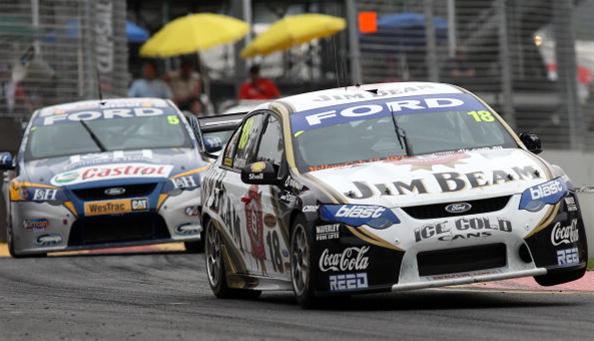Racing Drunk On Private Property Is DUI In Indiana — Maybe

Here’s something to consider: if you are operating a motor vehicle on private property, and you’ve been drinking, should that be considered DUI? What if you’re on a racetrack that is closed to the general public?
According to Anderson Police Department public information officer, Joel Sandefur, [the driver] was black-flagged and forced out of a race Saturday night but re-entered the race where he intentionally crashed into another driver. No injuries were reported.
Sandefur said officers smelled alcohol on Lathan’s breath after the race and several witnesses reportedly saw him drinking between races.
Let me make one thing, as they say, perfectly clear: as a racer with some circle-track experience, I find the idea of racing an automobile impaired by any substance to be completely beneath contempt. I won’t line up on the grid next to someone who is obviously drunk and nor should anyone else. This moron should be suspended for a year or longer from every sanction in the country.
With that said: when you lose your temper and run into someone during a race you aren’t charged with assault. When you crash your race car you aren’t charged with failure to control. If you short-brake someone going into the Esses at Mid-Ohio you aren’t charged with six-point reckless op. And, of course, there’s no penalty for speeding on a track. These things are handled within the event, the same way that my son isn’t charged with assault for punching someone in the face during his Tae Kwon Do class. So why is driving drunk around a racetrack subject to official intervention?
The answer apparently depends on the state in which the incident happens. According to Breitbart’s Lawyers Of The Internet, Indiana has no exemption for OMVI on private property. (Our volunteer counsel, Curvy McLegalbriefs, submitted this story for review but offered no opinion on the law in Indiana.) There’s something scary about that. If you want to get drunk and drive a tractor around your back yard, shouldn’t that be legal? These aren’t street-legal cars and this event was closed to the public in the sense that you can’t just show up and drive. Where should the line be drawn?

More by Jack Baruth
Latest Car Reviews
Read moreLatest Product Reviews
Read moreRecent Comments
- Tassos Jong-iL Not all martyrs see divinity, but at least you tried.
- ChristianWimmer My girlfriend has a BMW i3S. She has no garage. Her car parks on the street in front of her apartment throughout the year. The closest charging station in her neighborhood is about 1 kilometer away. She has no EV-charging at work.When her charge is low and she’s on the way home, she will visit that closest 1 km away charger (which can charge two cars) , park her car there (if it’s not occupied) and then she has two hours time to charge her car before she is by law required to move. After hooking up her car to the charger, she has to walk that 1 km home and go back in 2 hours. It’s not practical for sure and she does find it annoying.Her daily trip to work is about 8 km. The 225 km range of her BMW i3S will last her for a week or two and that’s fine for her. I would never be able to handle this “stress”. I prefer pulling up to a gas station, spend barely 2 minutes filling up my small 53 liter fuel tank, pay for the gas and then manage almost 720 km range in my 25-35% thermal efficient internal combustion engine vehicle.
- Tassos Jong-iL Here in North Korea we are lucky to have any tires.
- Drnoose Tim, perhaps you should prepare for a conversation like that BEFORE you go on. The reality is, range and charging is everything, and you know that. Better luck next time!
- Buickman burn that oil!


































Comments
Join the conversation
This one strikes pretty close to home as I sort of do this all the time. Have drinks at the family home, drive 4-wheeler out to cabin/pond whatever, all on personally built trails and roads. That being said not only is he clearly in violation of the law but he ought to be charged as well, the difference is in police access to the crime. In my (not-so) hypothetical situation any police officer attempting to cite me would have to trespass to gain access to the crime, and certainly would not have a warrant or reasonable suspicion to enter an area where I do this (assuming I'm not also hosing the wilderness with automatic weapons fire or fireworks). If, on the other hand, you are close enough to public property to be seen obviously driving drunk, or private property with invited police, then you do represent a risk to unsuspecting road users. How safe would you feel on the highway if some farmer's parallel access road was populated by recklessly drunk farm hands traveling at high speeds? I'd bet the laws were written broadly for just this reason. For that matter, imagine a private dirt bike track going in immediately adjacent to a high school football field. Sure it's private property, but the public is very much exposed to the risk and anyone would want to stop drunk driving there. Cases of police writing DUI for people sleeping in cars (even with keys IN ignition for warmth) is reprehensible and a textbook case of malicious or self-interested application of the criminal code (filling quota for ex.). Any officer writing such a ticket, or the prosecutor pursuing it, should be publicly shamed to the extent that future promotion is impossible. I'd say it's a great indicator of someone not having the character to be trusted with a high responsibility job (not even running a day care). Also, it's totally unrelated to the article's example, which is absolutely all about shoving risk into other people's sphere of influence.
I might also add, if I was on the track that day I would be out of control angry at the guy driving drunk into people on purpose. Getting arrested would be the best possible outcome for him, and maybe it was here. It's not mentioned in the article but I wouldn't be suprised if the police closed on him because he was about to get in a fight and then smelled alcohol. I highly doubt they were out on the grid breathalyzing people or anything silly like that.